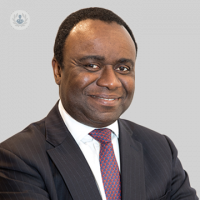What causes lower back pain and when should I be worried?
Written in association with:Lower back pain can easily interfere with daily life, and it can be frustrating if you don’t know what is causing it. If you have lower back pain, it’s important to visit a doctor to check that it isn’t indicative of a wider issue. Even if the cause of your pain cannot be found, there are still a number of possible treatments. In this article top spinal surgeon Mr Colin Nnadi explains what treatments might be offered, and in what situations surgery might be necessary.

What causes lower back pain?
The actual cause of lower back pain is generally unknown. However, it’s important to rule out the most serious things which can give rise to back problems. This can include cancers, infections, inflammatory problems, and even trauma.
When is lower back pain a cause for concern?
There are a number of things which could indicate a more serious problem:
- age – experiencing back pain under under the age of 20 or over 50
- type of pain – the pain is unremitting, disturbing sleep or normal daily activities
- associated weight loss
- a past history of cancer
- use of medication such as steroids
Patients presenting with features such as these must be investigated thoroughly by a specialist.
What treatments are available for lower back pain?
After excluding the more serious causes of lower back pain, the specialist will start with the simple measures such as encouraging patients to remain as active as possible.
Some patients would benefit from physiotherapy, which will take different forms in terms of engagement. Usually as a preliminary treatment, patients are shown exercises to do themselves and then given leaflets to take home. If that does not work, the physiotherapy often becomes more involved, taking the patients through exercise sessions on a regular basis.
In some cases a more invasive treatment might be required. For example, if back pain is associated with leg symptoms, cortisone injections may be recommended. In other cases the pain may have been persistent for quite some time, and may have begun to result in taking time off work or being unable to go out to meet friends. In this situation the specialist may offer a combination of:
- physiotherapy
- psychological treatments to help the patient develop coping strategies to deal with the pain
- over-the-counter medications (such as paracetamol and anti-inflammatory tablets) to help control the pain
When is surgery necessary?
Slipped disk
If the patient has been experiencing back pain for some time, and is experiencing leg pain as well, this can be indicative of a slipped disk. In rare cases, this can present as an emergency, where the nerve supply to the bowels and bladder is at risk.
In situations such as this, surgery is necessary to deal with leg symptoms and to preserve the patient’s bowel and bladder function, and therefore prevent long-term disability.
Back pain due to developmental problems
If a patient has mechanical back pain due to developmental problems with the spine, they may require surgery. If the patient is experiencing leg symptoms, surgery can address these.
Usually the procedure performed is a spinal fusion, which is facilitated by using metal work. This acts as scaffolding on the spine to provide stability as well as help the spine fuse, which helps with the pain.
If you’re worried about lower back pain, book a consultation with Mr Colin Nnadi now.


